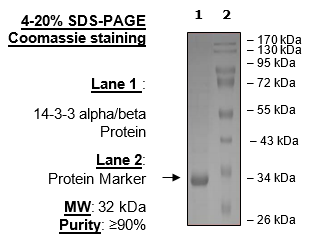14-3-3 alpha/beta Protein, His-tag (Mouse) Recombinant
Catalog #
79024
$395
*
●
●
Purchase
Description
Mouse 14-3-3 alpha/beta Protein, GenBank Accession No. NM_018753, full length, with N-terminal His tag, expressed in Sf9 insect cells using baculovirus. MW = 32 kDa.
●
Synonyms
14-3-3 alpha/beta, Ywhab; 1300003C17Rik; 14-3-3b
●
Product Data Gallery
Product Info
Storage and Usage
Citations
Species
Mouse
Host Species/Expression System
Sf9 insect cells using baculovirus
Formulation
50mM sodium phosphate, pH 7.0, 300mM NaCl, 150mM imidazole, 0.1mM PMSF, 0.25mM DTT, 25% glycerol
MW
32 kDa
Amino Acids
Full length
Genbank #
NM_018753
Background
14-3-3 alpha/beta is a member of the highly conserved 14-3-3 family of proteins which mediate signal transduction by binding to phosphoserine-containing proteins (1). 14-3-3 alpha/beta protein has been shown to interact with RAF1 and CDC25 phosphatases, suggesting that it may play a role in linking mitogenic signaling and the cell cycle machinery. 14-3-3-alpha/beta interacts with the TSC1-TSC2 dimer (2). The interaction required phosphorylation of TSC2 at Ser1210. Binding of 14-3-3-alpha/beta to TSC2 did not alter the interaction between TSC1 and TSC2, but it reduced the ability of the complex to inhibit phosphorylation of ribosomal protein S6 kinase impairing the ability of the complex to inhibit cell growth.
References
1. Yaffe, M B. et al: The structural basis for 14-3-3: phosphopeptide binding specificity. Cell 91: 961-971, 1997.
2. Shumway, S D. et al: 14-3-3-beta binds to and negatively regulates the tuberous sclerosis complex 2 (TSC2) tumor suppressor gene product, tuberin. J. Biol. Chem. 278: 2089-2092, 2003.


